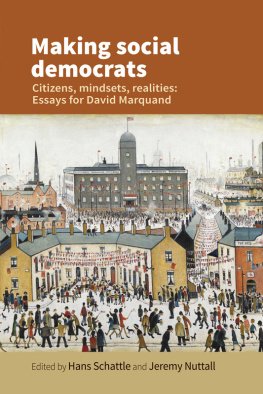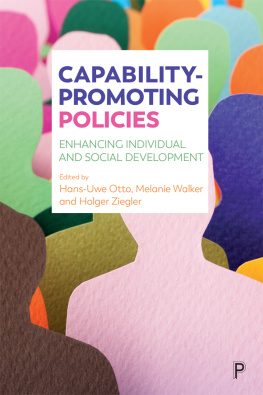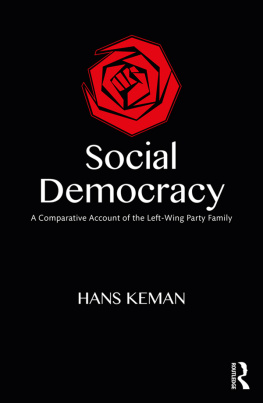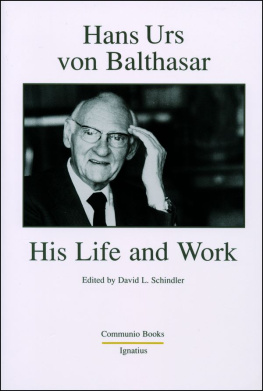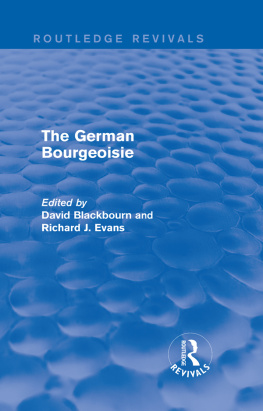Copyright Manchester University Press 2018
While copyright in the volume as a whole is vested in Manchester University Press, copyright in individual chapters belongs to their respective authors, and no chapter may be reproduced wholly or in part without the express permission in writing of both author and publisher.
Published by Manchester University Press
Altrincham Street, Manchester M1 7JA
www.manchesteruniversitypress.co.uk
British Library Cataloguing-in-Publication Data
A catalogue record for this book is available from the British Library
ISBN 978 1 5261 2030 4 hardback
First published 2018
The publisher has no responsibility for the persistence or accuracy of URLs for any external or third-party internet websites referred to in this book, and does not guarantee that any content on such websites is, or will remain, accurate or appropriate.
Typeset in Minion Pro-Regular
by Toppan Best-set Premedia Limited
Gideon Calder is Director of the social policy programme at Swansea University, and works on the application of political and ethical theory to issues of current social concern. He is author or editor of ten books most recently The Routledge Handbook of Philosophy of Childhood and Children (2018) and co-edits the journal Ethics and Social Welfare.
Michael Freeden is Emeritus Professor of Politics, University of Oxford and Professorial Research Associate, SOAS, University of London and, most recently, author of The Political Theory of Political Thinking and Liberalism: A Very Short Introduction (2013). He is the founder-editor of the Journal of Political Ideologies and is currently working on European conceptual history and on silence in political theory.
Andrew Gamble is Professor of Politics, University of Sheffield, and Emeritus Professor of Politics, University of Cambridge. His most recent book is Can The Welfare State Survive? (2016).
Clare Griffiths is Professor of Modern History at Cardiff University. Her publications include Labour and the Countryside: The Politics of Rural Britain 19181939 (2007) and the co-edited collection of essays Classes, Cultures, and Politics (2011).
Will Hutton is Principal of Hertford College, University of Oxford, and Chair of the Big Innovation Centre. A columnist for the Observer and the Guardian, he was the author of The State We're In (1995).
Ben Jackson is Associate Professor of Modern History at Oxford University and co-editor of Political Quarterly. He is the author of Equality and the British Left (2007) and the co-editor of Making Thatcher's Britain (2012).
Neal Lawson is Chair of the good society pressure group Compass. He was author of All Consuming (2009).
David Marquand is Honorary Distinguished Professor in the School of Law and Politics at Cardiff University and former principal of Mansfield College, Oxford. He is a former parliamentarian at Westminster, a Fellow of the British Academy and author of nine books on British history, politics and political economy.
Kenneth O. Morgan has been Fellow of The Queen's College, Oxford,196689, Vice-Chancellor in the University of Wales 198995, a Labour peer since 2000 and visiting Professor at King's College London since 2013. His thirty-five books include The Oxford Illustrated History of Britain (1984) and biographies of Lloyd George, Keir Hardie, James Callaghan and Michael Foot.
Jeremy Nuttall is Senior Lecturer in Modern British History at Kingston University, London. He is author of the book Psychological Socialism: The Labour Party and Qualities of Mind and Character (2006), and of articles on British social democracy in leading journals like Historical Journal and English Historical Review.
David Owen is an Independent Social Democrat peer. He was Foreign Secretary (197779), Leader of the SDP (198390), and EU peace negotiator in the former Yugoslavia (199295), and is the author of British Foreign Policy After Brexit (2017).
Hans Schattle is Professor of Political Science at Yonsei University in Seoul, South Korea. He is the author of The Practices of Global Citizenship (2008) and Globalization and Citizenship (2012), both published by Rowman & Littlefield, as well as numerous academic journal articles on citizenship, civil society and democracy.
Stuart White is a tutor in Politics at Jesus College, Oxford. He is the author of The Civic Minimum (2003), Equality (2006), co-editor with Nik Seth-Smith of the e-book Democratic Wealth (2014), and is currently working on a book provisionally entitled Democracy Over Wealth? Liberal Republican Political Economy.
Tony Wright is a former Labour MP who is Professor of Government and Public Policy at University College London. His many books on politics and political ideas include, most recently, British Politics: A Very Short Introduction (2013).
1
Making social democrats
Jeremy Nuttall and Hans Schattle
Social democracy in the age (or moment) of Brexit and Trump: decline or renewal?
: 245).
These challenges are very real, yet the above picture is a partial one. It runs the risks both of conforming to the traditional tendency of many on the left, to focus primarily on the bleaker sides of social and political trends, and of magnifying relatively recent and short-lasting right-wing populist advances into something solidified, uniform and even irreversible. It is the contention of this volume that both political history and political present are more complex, multi-sided and essentially mixed than that, and social democrats need not resign themselves either to the inevitability or the endurance of the current state of affairs. As in times past, the constraints upon, and threats to, progress stand alongside achievements and new opportunities. While Labour won fewer elections than the Conservatives in the twentieth century, the extensions of welfare protection, civil liberties, democracy and educational opportunity to which its governments gave effect, most notably in office from 1945, 1964 and 1997, made a lasting impact, and often survived, at least in important measure, through long ensuing periods of Conservative rule. Social democracy's often diffuse societal, intellectual and cultural influences have exceeded and outlasted Labour's direct electoral success.
Moreover, even by the narrower electoral measure, it must be remembered that Labour's fall from power in 2010 came after, by far, its longest sustained period of electoral success. Albeit tentatively, the securing of the French presidency in 2017 by Emmanuel Macron, has suggested scope for a reinvigoration of centrist or centre-left electoral accomplishment, or at least, as also in recent elections in the Netherlands, and in the collapse of UKIP's vote in the 2017 British general election, the beginnings of a plateau and perhaps a diminution in the populist appeal. Even in the context of Trump's victory, it is too rarely remembered that the Democratic Party have still had the better of US presidential election results since 1992, and even more so in terms of share of the popular vote as even in its defeats of 2000, and again in 2016 itself.
: 246). In many ways, this description goes to the heart of the meaning and the challenge of social democracy, and of progressive politics more broadly. It highlights that real progress, both social and individual advances, must in some profound sense be achieved

